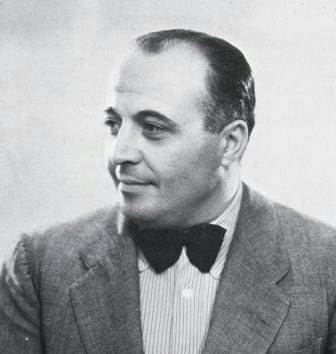|
Saturdee
Opry Links # 85: Grab Bag Edition
 
Domenico Mastronardi
Eleanor Steber
Saturdee Opry Links Overture.
Mozart, "Cosi Fan Tutte."
https://www.youtube.com/watch?v=Dz5jy8dNWRo
1. Domenico Mastronardi. Never heard of him? Me, neither. So many great singers
have come and gone, now largely forgotten. There is little information about
Mastronardi, next to none, really---but there are recordings. Here is the
robust, warm, lyrical baritone of the 20's and 30's at work---with the robust,
lyrical fave aria, "Votre toast, je peux vous le rendre," from "Carmen," by
Bizet. Also known as the Toreador Song. (Don't spit on the floor-ay.) Should get
the blood flowing.
https://www.youtube.com/watch?v=-nE7vVLa28w
Synopsis: Escamillo boasts of his conquest in the bull ring, and more or less
says he is available to women.
Translation:
http://www.aria-database.com/search.php?individualAria=46
2. The noble duet, "Au Fond du Temple Saint," from "The Pearl Fishers," by
Bizet, is, of course, deeply loved. The famous Richard Tucker/Robert Merrill
version is duly hallowed, but here is one to rival it, at least for sheer
feeling. Once again here is the forgotten baritone, Domenico Mastronardi, this
time with the forgotten tenor, Franco Foresta (Frank Forest of Minnesota, to be
technical), with some glorious music. Note: sung in Spanish instead of customary
French.
Synopsis: Nadir and Zurga have reunited after Nadir has been wandering in the
jungle for years. At one time, Zurga and Nadir were friends, but their
friendship ended over rivalry for the Brahmin priestess, Léïla. (It's always a
woman!) They dismiss their old grudges against each other and now vow to be
friends forever.
https://www.youtube.com/watch?v=T-hdXaqG-Kg
Translation:
https://en.wikipedia.org/wiki/Au_fond_du_temple_saint
(Note: this recording is in Spanish, though the translation, of course, is
accurate.)
3. Forgotten bass # 2: Andrés Perello de Segurola, who sang with the
Metropolitan Opera from 1901 to 1920. His is quite a story. Born in Barcelona,
he was initially a lawyer, but his great love of music drew him to study voice
and sing operatically. (Phew---he dodged a bullet there!) De Segurola created
such a sensation at opera houses in Italy and France that the Met scooped him
up, and he spent the rest of his career in the U.S.. Once a personal assistant
to Caruso, he was invited by Gloria Swanson to appear in movies. He appeared
only in one, "The Cardboard Lover," with Marion Davies, in 1928, his second
career being stopped by a terrible car accident that cost him his sight. De
Segurola retired to teaching for the rest of his life. Here is a very early
recording, from 1906, in which he sings the long, beautiful lines of Bellini's
aria, "Vi ravviso o luoghi ameni," from "La Sonnambula."
Setting: The village green of a village in Switzerland, early 19th century
Synopsis: Count Rodolfo has arrived at Lisa's inn in disguise to stay a night.
He speaks to himself of the days of his youth when all was tranquil and serene.
He regrets that he will never be able to experience those days again.
https://www.youtube.com/watch?v=c1q2Pw4y7Bw&feature=share
Rough translation:
"I warn you, pleasant places,
In which you rejoice, in which you calm
I don't mind the passing
Of the first youth!
Dear places, I found you again,
But you do not find me anymore!"
Italian:
Vi ravviso, o luoghi ameni,
In cui lieti, in cui sereni
Si tranquillo i d’ passai
Della prima giovent!
Cari luoghi, io vi trovai,
Ma quei d non trovo pi!
4. Here, once more, is the forgotten bass, Andres de Segurola, with the poignant
aria, "Addio, Vecchia Zimarra" ("Goodbye, Old Coat"), from Puccini's "La Boheme."
In this scene, the Bohemian philosopher, Colline, decides to pawn his favorite
coat in order to procure medicine for his friend, Mimi, who is dying. The
recording is 108 years old, yet de Segurola's heart is loud and clear.
https://www.youtube.com/watch?v=ndg0uHFHuSo&list=PL8lsbxgYnVyl_xptvhFX7myDwyv1vuZ4D
Setting: An attic room
Synopsis: After Mimi has collapsed on the staircase to the attic room, she is
carried into the room. On the edge of death, she says that her hands are cold.
In order to buy her something to keep her hands warm, Musetta pawns her jewelry
and Colline decides to pawn his old overcoat, to which he sings farewell.
Translation:
https://www.opera-arias.com/puccini/la-boh%C3%A8me/vecchia-zimarra-senti/
5. In our last forgotten bass-baritone of the morning, here is Giuseppe Danise.
Yet another bass who started out to study law (!), Danise sang all over Italy,
Europe, and South America for twenty long years before landing at the Met. And
being drafted into World War I for a couple of years did not help matters. In
any case, he wound up singing 425 performances at the Met, yet is little
remembered today---as is the case with countless singers of the past. Here he is
with the "greatest hit," "Largo al Factotum," from Rossini's "Barber of Seville"
(just to lift spirits after the preceding Puccini aria.) Make way for the topman
of the city!
Setting: Outside Dr. Bartolo's house at daybreak
Synopsis: Figaro sings of his many talents that make him a good doctor, barber,
matchmaker, etc.
https://www.youtube.com/watch?v=sl-JqJs0aoU
Translation:
http://www.aria-database.com/translations/barber01_largo.txt
6. Eleanor Steber was a star. The first U.S.-born soprano to have major success,
her big, flexible voice was a staple at the Met from 1940 to 1961. And a big
voice it was, lending itself to Strauss, Wagner, Berg, Barber---yet also
excelling at the lighter, more lyrical roles of Mozart. (How do they do it?)
Here she is with the heart-rending Puccini aria, "Vissi d'arte" ("I lived for
art"), from "Tosca," but she is singing it in a way I have never, never heard
before. Where most sopranos sing it in fairly "as written" fashion, emphasizing
the lyrical beauty and pathos of the scene, Steber assays it almost heroically
(!). I will include a link to Sondra Radvanovksy singing the same aria for
comparison.
https://www.youtube.com/watch?v=P25-4alk-pg
Synopsis: In this scene, Tosca has just been bribed to provide sex to Baron
Scarpia in exchange for the life of her beloved, Cavaradossi, who is imprisoned
and facing execution. She asks God to explain this injustice.
Translation:
https://en.wikipedia.org/wiki/Vissi_d%27arte
Radvanovsky:
https://www.youtube.com/watch?v=F7u77WFkcKQ
7. Eleanor Steber didn't have it easy. Her achievement was hard won, but she
also struggled with alcoholism and asthma---and stormy relationships. There is
an anecdote about her recording debut in the late 40's, in which she arrived at
EMI (now Abbey Road Studios) for sessions to have included Mozart and various
popular arias. Problem is, she had been up all night, and was feeling lousy.
(One surmises booze and fighting.) She was unable to sing the expected arias,
making the excuse that she didn't feel like it. (She probably didn't---hard to
sing anything as upbeat as Mozart when you are in a bad frame of mind.) The
conductor said, "Well, what DO you feel like singing?" and Steber said, "Depuis
Le Jour," from "Louise," by Charpentier. Parts were secured for the orchestra,
and the recording was made. Here it is.
https://www.youtube.com/watch?v=9UvBwKHsk8U
Setting: a small garden next to the Montmartre, Paris, 1900
Synopsis: Louise describes how her life has changed since moving in with Julien.
She revels in his love for her and her life which grows better every day.
Translation:
http://www.aria-database.com/search.php?individualAria=1203
8. "Pace, Pace, mio dio"---Peace, peace, my God---from Verdi's "La Forza del
Destino" ("The Force of Destiny"), as sung by the great Eleanor Steber. In this
scene, Leonora implores the almighty to bring peace to her tortured soul---a
sentiment I think we can all identify with, no doubt excepting Trump and Jeff
Bezos.
Setting: Outside the cave where Leonora has come to live out her remaining days
in repentance.
Synopsis: Leonora calls for peace from God on her tortued soul. She still loves
Alvaro after all these years and the bad things that have happened. She calls
upon God to end her suffering.
https://www.youtube.com/watch?v=iFAi9SURdyw
Translation:
https://opera-cat.livejournal.com/18788.html
9. Curious thing, this opera business. Here you would think that the technique
and voice required for Mozart (light, lyrical, coloratura) could not be farther
from that required for Wagner (heavy, powerful), and yet here is Eleanor
Steber's opinion:
"Wagner is just an extension of the beautiful line that you get when you’re
doing Mozart. The style is romantic and requires a great deal of expansion of
tone and expression."
Well, it worked for her! Here she sings the ethereal "Einsam in trüben Tagen,"
also known as "Elsa's Dream," from Wagner's "Lohengrin."
https://www.youtube.com/watch?v=PG06He1T1Ug
Setting: a plain on the banks of the Schelbt, Antwerp, first half of the 10th
century
Synopsis: Elsa relates one of her dreams in which a knight in white was sent to
her by God to defend her.
Translation:
http://www.amandaholden.org.uk/translations/opera-translations/lohengrin/
INTERVIEW WITH STEBER:
http://www.bruceduffie.com/steber.html
10. FINAL BOW:
Back to our forgotten baritone, Domenico Mastronardi, who opened the
proceedings. Here he is with a tremendous rendition of the moving prologue to "I
Pagliacci," by Leoncavallo. The character, Tonio, steps in front of the curtain
during the overture to explain why the composer wrote the opera as he did. He
goes on to say that the drama that the audience will view is not merely a play,
but a real story with actors who have have real feelings, etc.
This is "Si Puo."
"You will see the sad fruits of hate.
The spasms of pain,
Shouts of rage, you will hear,
And also laughter!
And you, rather than
Our poor actors’ changes,
Consider our soul,
Since we are men of flesh and bone,
And from this orphan world
We breathe the same air as you!"
Translation:
http://operainenglish.blogspot.com/2011/11/si-puo-pagliacci_29.html
https://www.youtube.com/watch?v=BvNGL4n1oD4
Saturdee Opry Links Encore!
https://www.youtube.com/watch?v=Z0PMq4XGtZ4
"Vesti la Giubba," or "Put on the Costume," from "Il Pagliacci," by Leoncavallo.
The great Luciano Pavarotti.
Setting: The entrance to a village, Calabria, Italy, 1860s
Synopsis: Canio sings that, although his love has betrayed him and his heart is
shattered, he must somehow go on stage and show a cheerful face to the audience.
Translation:
http://www.aria-database.com/search.php?individualAria=595
Back to Opera Links
Back to Home Page
|



